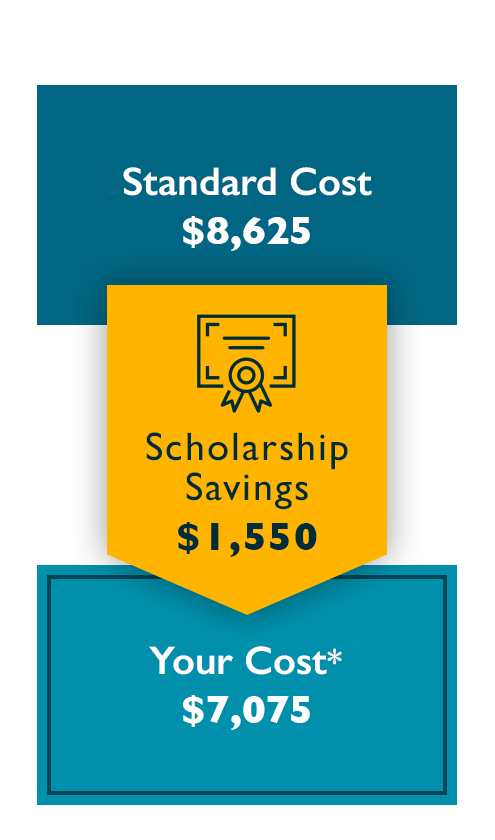Why Choose Walden?
Program Details
Curriculum
Minimum Degree Requirements
- 180 quarter credits
- General education courses (45 cr.)
- Core courses (75 cr.)
- Elective courses (55 cr.)
- Capstone course (5 cr.)
The BS in Early Childhood Studies online program is delivered through Tempo Learning®. This means that rather than progressing toward your degree course by course, you move through the program by completing competencies.
Competencies are skills, knowledge, and abilities that students use to demonstrate their progress. For each degree, a series of competencies that students need to be successful in their careers is identified. By completing all the competencies within a degree program, students demonstrate that they have acquired skills and knowledge specifically identified by leaders in their field and are able to apply them immediately in the workplace.
Mastery of competencies is proven through a variety of assessments.
The BS in Early Childhood Studies program competencies are grouped within areas of expertise.
Students may be eligible to transfer up to 135 credits*. At least 45 credits must be completed at Walden.
*Please note: Students that reside in Virginia may be eligible to transfer up to 125 credits. At least 55 credits must be completed at Walden.
View the COMPLETE CURRICULUM PLAN.
Tempo Learning®

With Tempo Learning, you may be able to complete your BS in Early Childhood Studies degree in as few as 15 months for as low as $8,000.*
*Represents Tempo Learning® format, Believe & Achieve Scholarship, and the fastest pace of our top 25% transfer students in this program in the Tempo Learning® format. Your actual total program time and costs may vary. Tuition and fees are subject to change. See Tuition and Fees section and Scholarship Details for more information.
Progress at Your Pace. Control Your Cost.
Walden’s Tempo Learning® programs follow a subscription-based pricing format. Students are billed a flat-rate for each 3-month subscription term. All pricing is represented in U.S. dollars and is subject to change.
| Program | Subscription Period Tuition | Subscription Period PROGRAM Fee | Subscription Period Time Frame |
|---|---|---|---|
| BS in Early Childhood Studies | $1,550 | $175 | 3-month subscription period |
| You may be able to complete your BS in Early Childhood Studies degree in 15 months for under $8,000.* | |||
*Represents Tempo Learning® format, Believe & Achieve Scholarship, and the fastest pace of our top 25% transfer students in this program in the Tempo Learning® format. Your actual total program time and costs will depend on your individual pace and transfer credits. A student’s pace is usually determined by their experience, ability to work independently, and availability. Believe & Achieve Scholarship savings based on current tuition. See Scholarship Details for more information.
Financial Aid
Financial aid is available for this program. Our financial aid advisors can help you identify funding opportunities to help you pay for your education.
Program Outcomes
Advance Teaching and Learning for Young Children
In Walden’s online bachelor’s in early childhood education program, you’ll deepen your understanding of children’s development through engaging courses, case studies, and virtual field experiences. Explore how partnerships with families, culturally responsive practice, and respect for each child’s worth can empower you to change lives. Our program’s curriculum is aligned with standards set forth by the National Association for the Education of Young Children (NAEYC).
Learning Outcomes - BS in Early Childhood Studies
As a graduate of this online bachelor’s in early childhood education program, you will be able to:
- Promote environments that are healthy, respectful, supportive, and challenging for all children (birth–8).
- Apply knowledge of child development to support positive outcomes for all children.
- Develop respectful and responsive partnerships with families and communities to support the healthy development and learning of young children.
- Differentiate practices to support a socially, culturally, and linguistically diverse population of young children and families, including those with exceptionalities.
- Apply reflective, collaborative, and critical perspectives to professional practice that promote advocacy and social change.
Related Articles
You May Also Be Interested In
FAQ About Walden’s Online BS in Early Childhood Studies - Tempo Competency-Based Learning
While early childhood education continues to be of high importance to parents, policymakers, and the public, many incorrectly identify this critical period as birth through preschool or kindergarten. Although the brain develops the majority of its neurons between birth and age 3, early childhood education is defined as the period of birth through age 8 correlating with the second- or third-grade level.
In terms of human development, the importance of early childhood education can’t be overstated. A child’s early years are the foundation for his or her future development, providing a strong base for lifelong learning and learning abilities, including cognitive and social development. Well-established research continues to emphasize the importance of early childhood education as an essential building block of a child’s future success.
Walden University’s BS in Early Childhood Studies, delivered in a competency-based format, is designed for education professionals who wish to develop the skills necessary to be successful in their career as early childhood professionals. Walden’s degree program includes the following areas of expertise:
- Becoming an Early Childhood Professional
- Early Childhood Development
- Health and Safety for Young Children
- Culturally Responsive Practice
- Children with Exceptionalities
- Child, Family, and Community Relationships
- Social-Emotional Development and Positive Guidance
- Effective Practices for Quality Programs Serving Young Children
- Early Literacy
- Observation, Assessment, and Planning
- Learning and Teaching in Inclusive Early Childhood Settings
- Play, Creativity and the Areas (P–3)
- Effective Practice for Infants and Toddlers
- Meaningful Learning Experiences
- Early Childhood Professionalism
- Professional Skills
The Perry Preschool Project is one of the most famous studies on the effects of attending preschool and is often a core topic in bachelor’s in early education programs.1 Conducted from 1962 to 1967, the Perry Preschool Project provided a high-quality preschool education to 3- and 4-year-old African American children who were living in poverty and deemed to be at high risk of school failure. By the time these preschool participants were 27–40 years of age, they had a number of successes as compared with the control group of students who had not attended preschool. The Perry Preschool Project showed that preschool attendees:
- Had a 44% higher high school graduation rate.
- Earned a median monthly income that was 42% higher than those who did not attend preschool.
- Were 26% less likely to have received government assistance.
- Encountered 50% fewer teen pregnancies.
1Source: https://evidencebasedprograms.org/programs/perry-preschool-project
The National Association for the Education of Young Children (NAEYC) is a professional organization dedicated to promoting high-quality early learning for all young children. Walden is a proud year-round sponsor of NAEYC, and the coursework in its BS in Early Childhood Studies program is aligned with NAEYC standards.
Integrating technology into the classroom for learning is important for a few different reasons. Not only is this movement cutting costs for textbooks and other classroom materials, it also allows for greater access to a wider range of online educational tools for students. By allowing more access to early childhood education through technology, we’re also preparing our children for our technologically advanced society. Additionally, certain programs and applications can help teachers and administrators track which resources are working best for their students.
Child development is a crucial part of early childhood and one of the primary focuses of an early childhood studies degree program. When you enroll in the BS in Early Childhood Studies program at Walden, you will gain knowledge in the area of child development through coursework competencies that you will then be able to apply to support positive outcomes for young learners.
1Source: O*Net Online. Summary Report for SOC Code 39-9011.00, Childcare Workers.
Note on Teacher Licensure or Certification
This program does not lead to teacher licensure or certification. Teachers are advised to contact their individual school districts as to whether this program may qualify for salary advancement.
Cost and time to completion varies by student, depending on individual progress. For information on estimating your time to degree completion with Tempo Learning, call an Enrollment Specialist at 855-646-5286.













